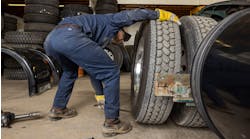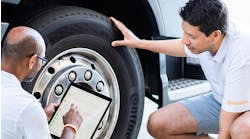As we try to climb out of the recession, both physically and mentally, I want to focus on the positive signs that 2010 will be better than 2009.
Through the first nine months of last year, following the worst recession in decades, more than one third of you were optimistic about your full-year sales.
How optimistic? Here’s a breakdown of Modern Tire Dealer’s “State-of-the-Industry Survey” for 3Q 2009.
Retail tire dealers: 37.4% predicted their tire unit sales would be up by an average of 10%, while 37.5% projected their tire dollar sales would be up by an average of 11%.
Wholesale tire dealers: 41% predicted their unit sales would be up by an average of 10%; 45.5% estimated dollar sales would be up by 11%.
There are some 29,000 independent retail and wholesale tire dealerships in the United States. So for more than 10,000 of you, 2009 was likely a decent year for selling tires. Close to half of you also predicted sales would be down in 2009, but hey, it’s a start.
It reminds me of the famous quote explaining the difference between a recession and a depression: “It’s a recession when your neighbor loses his job; it’s a depression when you lose yours.”
(That is a bipartisan quote, by the way. Both Harry Truman, a Democrat, and Ronald Reagan, a Republican, used it in public forums.)
At the annual KeyBank Economic Update in Canton, Ohio, in November, speakers Lynn Hamilton and Dr. Ken Mayland believed the economy was rebounding.
“The financial crisis is behind us, at least I think it is,” said Hamilton, a senior vice president and portfolio manager for KeyBank National Association. “We think earnings are going to recover.”
Mayland, president of Clearview Economics LLC and one of the pre-eminant economic forecasters in the country, said weekly initial claims for unemployment compensation peaked in March, “a strong signal the recession has ended.”
[PAGEBREAK]He also pointed out that the Purchasing Managers Index, which, among other things, indicates whether or not purchasing orders are increasing or decreasing, had been trending upward.
Although the national unemployment rate in October reached double digits for the first time since 1983, Mayland said the rate isn’t as relevant as the behavior of the people who remain working.
“It’s a standard end-of-recession behavior — they lower their savings rate. The spending rate goes up and that gets the juices flowing in the economy.”
He added that the unemployment rate is at its highest at the end of a recession. At the time of his presentation, the rate had reached 10.2%; in November, it had dropped to 10%.
Net losses were admittedly the rule rather than the exception for global tire manufacturers in 2009.
However, 15 of the 18 stocks we regularly follow on www.moderntiredealer.com were worth more at the end of the year than they were at the beginning.
Cooper Tire & Rubber Co.’s stock was up 225% over the course of the year, while Goodyear Tire & Rubber Co.’s was up 136%. Eleven of the 15 stocks were up at least 20%. Evidently a lot of people have confidence in our industry.
Finally, original equipment manufacturers may be ramping up production soon.
With the year winding down, J.D. Power and Associates projected December new-vehicle sales would be 7% higher than they were in December 2008.
“The market is continuing to improve, with the relative strength of December sales supporting a year-end rally,” said Gary Dilts, senior vice president of global automotive operations. “The December selling rate is tracking at 11.2 million units — up nearly 1 million units from one year ago — which sets up 2010 for further recovery.”
Jeff Schuster, executive director of global forecasting at J.D. Power, said the automotive industry isn’t out of the woods yet. But OEMs, by trimming fixed costs at all levels, have set themselves up for profitability.
“The industry has an opportunity in 2010 to build on a series of small victories — such as improved pricing and appropriate inventory levels — to drive a stronger recovery,” he added.
There you have it. Economic recovery is gaining momentum. Just stay the course, but stay alert.
As Mayland said, “Just because recovery is happening doesn’t mean your challenges are over.
“What if interest rates rise too much or inflation grows too much? Can you offset the damage?”
Will economic growth be sustainable? Based on the positive signs, I’d guess yes. ■
If you have any questions or comments, please e-mail me at [email protected].



